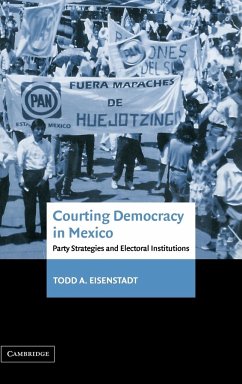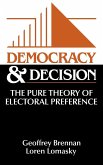Short description/annotation
This book is perhaps the most comprehensive explanation of Mexico's gradual transition to democracy.
Main description
This book documents Mexico's gradual transition to democracy, written from a novel perspective which pits opposition activists' post-electoral conflicts against their usage of regime-constructed electoral courts at the centre of the democratization process. It addresses the puzzle of why, during key moments of Mexico's 27-year democratic transition, opposition parties failed to use autonomous electoral courts established to mitigate the country's often violent post-electoral disputes, despite formal guarantees of court independence from the Party of the Institutional Revolution (PRI), Mexico's ruling party for 71 years (preceeding the watershed 2000 presidential elections). Drawing on hundreds of author interviews throughout Mexico over a three-year period and extensive original archival research, the author explores choices by the rightist National Action Party (PAN) and the leftist Party of the Democratic Revolution (PRD) between post-electoral conflict resolution via electoral courts and via traditional routes - mobilization and bargaining with the PRI-state.
Table of contents:
1. Electoral courts and actor compliance: opposition-authoritarian relations and protracted transitions; 2. Ties that bind and even constrict: why authoritarians tolerate electoral reforms; 3. Mexico's national electoral justice success: from oxymoron to legal norm in just over a decade; 4. Mexico's local electoral justice failures: gubernatorial (s)election beyond the shadows of the law; 5. The gap between law and practice: institutional failure and opposition success in postelectoral conflicts, 1989-2000; 6. The National Action Party: dilemmas of rightist oppositions defined by authoritarian collusion; 7. The party of the democratic revolution: from postelectoral movements to electoral competitors; 8. Dedazo from the center to finger pointing from the periphery: PRI hard-liners challenge Mexico's electoral institutions; 9. A quarter century of 'Mexicanization': lessons from a protracted transition; Appendix; Bibliography; Index.
Hinweis: Dieser Artikel kann nur an eine deutsche Lieferadresse ausgeliefert werden.
This book is perhaps the most comprehensive explanation of Mexico's gradual transition to democracy.
Main description
This book documents Mexico's gradual transition to democracy, written from a novel perspective which pits opposition activists' post-electoral conflicts against their usage of regime-constructed electoral courts at the centre of the democratization process. It addresses the puzzle of why, during key moments of Mexico's 27-year democratic transition, opposition parties failed to use autonomous electoral courts established to mitigate the country's often violent post-electoral disputes, despite formal guarantees of court independence from the Party of the Institutional Revolution (PRI), Mexico's ruling party for 71 years (preceeding the watershed 2000 presidential elections). Drawing on hundreds of author interviews throughout Mexico over a three-year period and extensive original archival research, the author explores choices by the rightist National Action Party (PAN) and the leftist Party of the Democratic Revolution (PRD) between post-electoral conflict resolution via electoral courts and via traditional routes - mobilization and bargaining with the PRI-state.
Table of contents:
1. Electoral courts and actor compliance: opposition-authoritarian relations and protracted transitions; 2. Ties that bind and even constrict: why authoritarians tolerate electoral reforms; 3. Mexico's national electoral justice success: from oxymoron to legal norm in just over a decade; 4. Mexico's local electoral justice failures: gubernatorial (s)election beyond the shadows of the law; 5. The gap between law and practice: institutional failure and opposition success in postelectoral conflicts, 1989-2000; 6. The National Action Party: dilemmas of rightist oppositions defined by authoritarian collusion; 7. The party of the democratic revolution: from postelectoral movements to electoral competitors; 8. Dedazo from the center to finger pointing from the periphery: PRI hard-liners challenge Mexico's electoral institutions; 9. A quarter century of 'Mexicanization': lessons from a protracted transition; Appendix; Bibliography; Index.
Hinweis: Dieser Artikel kann nur an eine deutsche Lieferadresse ausgeliefert werden.








